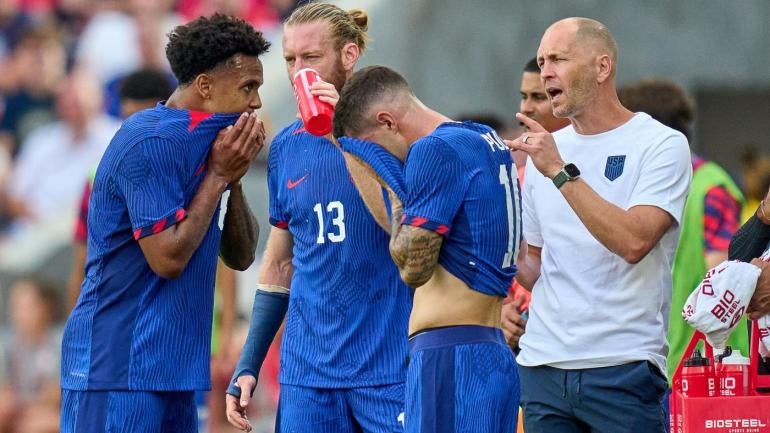
Gregg Berhalter marked his return to the touchline as the U.S. men's national team head coach with a 3-0 win over Uzbekistan in St. Louis on Saturday, but the scoreline largely flattered a side that was lackluster for long stretches of the game.
The USMNT took the lead early when Tim Weah scored in the fourth minute but did not get their final two goals of the match until second-half stoppage time. In between those two bursts of action, the hosts frequently failed to hit an attacking rhythm and had difficulty finishing off their chances. The end result was a slow match that meant Berhalter and his team could mark his return with little fanfare.
That said, Berhalter's honesty was coupled with a level-headed outlook on the game, a point of view familiar to any leader at the start of a new challenge.

Golazo Starting XI Newsletter
Get your Soccer Fix from Around the Globe
Your ultimate guide to the Beautiful Game as our experts take you beyond the pitch and around the globe with news that matters.
Thanks for signing up!
Keep an eye on your inbox.
Sorry!
There was an error processing your subscription.
"I think that it's a good baseline for us to start," the head coach said following the match. "This is what international competition from other regions looks like, that we use as we go."
The match left plenty of food for thought before the USMNT resumes action on Tuesday in Saint Paul, Minnesota against Oman. Here are three takeaways that needs to be addressed:
Correct attacking inconsistencies
Expectations were high for the USMNT to pick up a commanding result against Uzbekistan, which did transpire in a few categories outside of just goals. The team had 64.5% possession and beat their opponents in expected goals 2.5 to 0.75, had nearly double the number of passes that Uzbekistan did and completed 89.8% of their 648 passes.
Uzbekistan, though, kept pace in a handful of categories or outright outperformed the USMNT. The visitors boasted a passing accuracy of 86.5%, a number that grew to 88.2% when considering passes in the attacking third. Uzbekistan beat the USMNT's 84.2% in the latter category and in shots -- they had 15 shots to the hosts' 13, though the USMNT had six on target while Uzbekistan only had three.
Berhalter chalked up the USMNT's uneven attacking performance to the fact that Uzbekistan played a back five, which his side had a tough time breaking down. He also noted that the U.S. were slower than they needed to be going forward.
Don't miss CBS Sports Golazo Network's Morning Footy, now in podcast form! Our crew brings you all the news, views, highlights and laughs you need to follow the Beautiful Game in every corner of the globe, every Monday-Friday all year long
"When we were building, and we were methodical about our build, trying to attract the opponent, I thought we then lacked the [ability to speed] up the attack once we broke through that front five, and that could've been better," the head coach said. "Back five is always difficult to break down and you saw that they just dropped and wanted to get in behind and we didn't do that often enough and then the other thing I'd note is that our press after loss, defensive transition needs to get better. I think we gave them too many opportunities to get behind us when we could've been positioned better to win the ball immediately after we lost it."
Goalscorers Weah and Christian Pulisic, who converted a penalty in the 95th minute, were two of the standout performers up top with three shots each and an ability to find space on the wings. Folarin Balogun and Ricardo Pepi, who each split a half, had bright spots but were unable to lock down the center forward position as theirs in this game.
See what more new faces are made of
Berhalter will have the chance to tinker with his team for Tuesday's game, including in goal. First-choice keeper Matt Turner returned to England after the Uzbekistan result as he and his wife await the arrival of their second child, which will give either Ethan Horvath or Drake Callendar a shot against Oman. The head coach may also have to make a change in midfield after Luca de la Torre exited the match in the 35th minute with an injury, but Berhalter said he's "not sure he's ruled out for next game." The team is awaiting news on Sunday from the medical team before making a decision.
The head coach might also opt to play a handful of newcomers that highlighted his first roster since returning to the job. Danish-American defender Kristoffer Lund made his debut against Uzbekistan, and three more could follow on Tuesday. Callendar is uncapped, as are Wolfsburg's Kevin Paredes and Argentinian-American midfielder Benjamin Cremaschi.
The matches will not cap-tie the dual nations on the roster, but time with the national team could serve as a convincing argument before the Concacaf Nations League quarterfinals in November offer a chance for both players to commit their international futures to the USMNT.
Answer the key questions around expectations
Even though this match was far from Beralter's first in charge of the USMNT, the moment still came with some of the feelings that come with a new beginning. That contrast almost makes it hard to figure out how to judge Berhalter in his second spell. It id, undoubtedly, his job to evolve the team and help a young group of players turn into reliable veterans once the World Cup hits home soil in 2026.
A handful of questions popped up once Berhalter's return was official, chiefly: What does that evolution look like? Will the changes be easy to notice or subtle? How much can a team change with the same coach and similar player pool? Will that be enough for the USMNT to earn desired results at major tournaments like the Copa America, where they are expected to compete next year, and the World Cup?
Berhalter did not answer that question in his first game back, but a sample size that small was unlikely to reveal much. What the win over Uzbekistan does offer is, as Berhalter suggested, a baseline, not just as one that reveals how the USMNT stack up against Asian competition but what the head coach's second tenure can be compared to when all is said and done. Even an unflashy new beginning is still a new beginning, and the USMNT's imperfect performance serves as a meaningful starting point to gauge where the team needs to go -- and the work Berhalter and company need to do to get there.

















